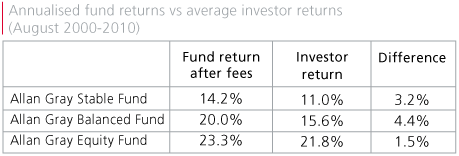In past issues we have highlighted the potential gap between a unit trust's returns and the returns achieved by the average investor in that fund. A fund's published returns assume that a lump sum remains invested over a stated period. In reality, people invest and make withdrawals over time, and generally are more tempted to invest after outperformance and to disinvest following underperformance.
Earlier this year market research firm Dalbar Inc. published the latest US statistics that describe this phenomenon. The study showed that over the 20 years to the end of 2009, the average US investor earned 3.2% in US equity mutual funds, while the market returned 8.2% in that country.
Our goal at Allan Gray is to make money over the long term for our clients. Clients who are invested in unit trusts have an opportunity to match or beat fund returns by remaining invested for long periods, and by being contrarian in their choice of when to invest or to withdraw their units. Unfortunately, like the American investors in the Dalbar study, our clients have earned lower returns than our funds over the last decade, as shown in the table below.

This is disappointing, particularly for the Balanced and Stable funds, where we are tasked with allocating assets between different asset classes like shares, bonds, property and cash. In these funds, frequent investor switching is not necessary as the funds have the freedom to take on more or less risk on behalf of investors.
When considering your next investment into a fund, or if you are planning to switch between funds, please remember that in general, those clients who have done best out of our services have picked a fund carefully and then remained invested without switching.
This issue of the Quarterly Commentary includes two examples to demonstrate the application of our investment philosophy. As you may expect, as value-based contrarian managers we invested in Didata when the profitability of the business was well below normal and the share price depressed. Our investment case essentially hinged on a turnaround in the business and we were able to buy the shares at a deep discount to our estimate of the company's value. Nippon Telegraph and Telephone Corporation (NTT) has recently offered to purchase the whole of Didata for 120p (around 1400 cents) a share, an offer which we consider to be fair value, and considerably more than the average price our clients paid for their stake.
In the second example Chris du Toit and Tamryn Lamb remind us how Allan Gray and Orbis share the same philosophy. They look at the rationale behind Orbis' decision to invest in Spanish Bank Banco Bilbao Vizcaya Argentaria. Although sentiment towards Spanish banks in general has turned extremely negative due to concerns over the state of the Spanish banking system and economy, Orbis believes this company has some specific features which make it an attractive investment.
I would like to end off by noting that Allan Gray Life Limited recently celebrated its 10th anniversary. Since it received its licence in August 2000, it now serves roughly 330 pension fund clients, 13 300 pensioners in our living annuity and 2 500 long-term savers invested through our endowment product. Thank you to all of you for your support. We are doing our utmost to make the next decade as successful as the last for Allan Gray Life.
